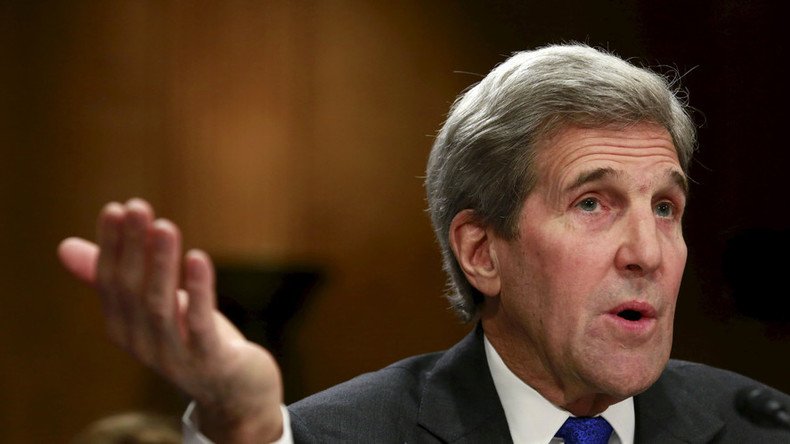Friend or foe? State Dept, Pentagon split on whether Russia poses threat

As the US-Russia brokered Syrian ceasefire looms, Secretary John Kerry has been displaying a warm attitude towards Moscow, stressing mutual goals and cooperation, but the Pentagon appears to be reading from a different playbook, calling Russia an enemy.
On Thursday, the US Secretary of State testified before Congress trying to sell legislators on a $50 billion budget for his department, calling it “the minimum price” for America’s leadership for the next year.
In his fourth testimony this week, Kerry pointed out the scope of the US’ “simultaneous” engagements across the world, while also stressing the need to keep national security strong and protect America’s interests.
Russia role vital to Syrian truce, but US has ‘Plan B’ – Kerryhttps://t.co/VMbWbGwM4vpic.twitter.com/M8OXY0ODVn
— RT America (@RT_America) February 24, 2016
With regard to Washington’s international challenges, specifically the scale of radical Islamic extremism, Kerry was asked if he agreed that Russia poses a greater threat than jihadists.
“If you wanted me to put on the table the top threat to the United States today, in terms of day to day life and the stability of the world, it is violent extremism, radical religious extremism and violence…” he began to reply. Kerry was interrupted by Congressman Dana Rohrabacher (R-California), who called the Secretary out for being “unable” to say “radical Islamic” when referring to terrorism.
Beginning with President Obama’s comments of September 2014, when he said Russia posed more of a threat than Islamic State, the US has repeatedly labeled Moscow as a top threat to America’s national security.
“What the Defense Department and others have been saying is that they see activities that Russia is engaged in, which present challenges – for instance, what happened to Crimea, what happened in Donbass, what happens with support for the separatists, the long process of back and forth on Minsk implementation – is interpreted by the frontline states as a threat,” Kerry explained.
Russia tops #ISIS threat, #Ebola worst of all? Lavrov puzzled with Obama’s UN speech http://t.co/5UCcTiCmpRpic.twitter.com/XYiO1jtW6f
— RT (@RT_com) September 24, 2014
While “touring” Capitol Hill this week, the Secretary has been trying to persuade lawmakers of Russia’s essential cooperation and key role in hammering out the Syrian ceasefire deal, notably in contrast with the Obama’s administration’s frequent anti-Russian rhetoric.
As Kerry was making his remarks on cooperative relations with Russia to the House Foreign Affairs Committee, just down the hall General Philip M. Breedlove was telling the House Armed Services Committee that “Russia has chosen to be an adversary and poses a long-term existential threat.”
READ MORE: Pentagon attacks on Russia linked to military budget debate in Congress – MoD
While the State Department is looking for $50 billion, as the US is “trying to cooperate with Russia” in fighting Islamic State, the Pentagon is seeking $582.7 billion to counter Russia and China, America’s “most stressing competitors,” in the words of Defense Secretary Ash Carter.
BREAKING: #Pentagon wants $582bn in funding as part of fiscal year 2017 budget https://t.co/65t2IIo26zpic.twitter.com/97tAs9lSA8
— RT America (@RT_America) February 2, 2016
“To counter Russia, Eucom, working with allies and partners, is deterring Russia now and preparing to fight and win if necessary,” Breedlove, the commander of US forces in Europe, said.
However, at least for Congressman Rohrabacher, this sounds like a non-starter.
“Let me just note that increasing the spending of our military spending in Europe so that we’ll have now have more tanks in Europe could be taken as a hostile act by Russia as well,” he told Kerry. “So I want to get out of this cycle of well we’re going to find things that they are doing hostile and vice versa.”












